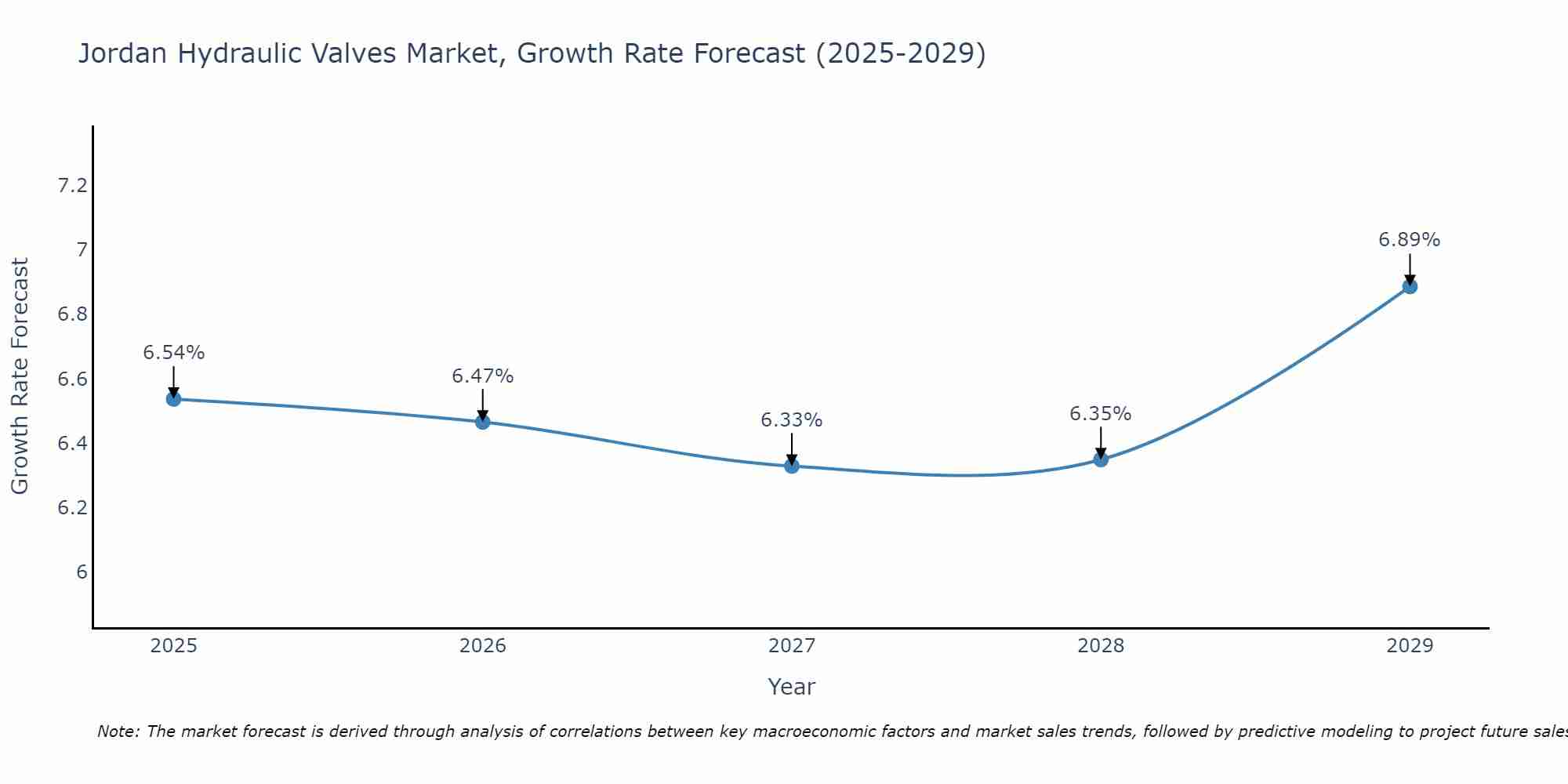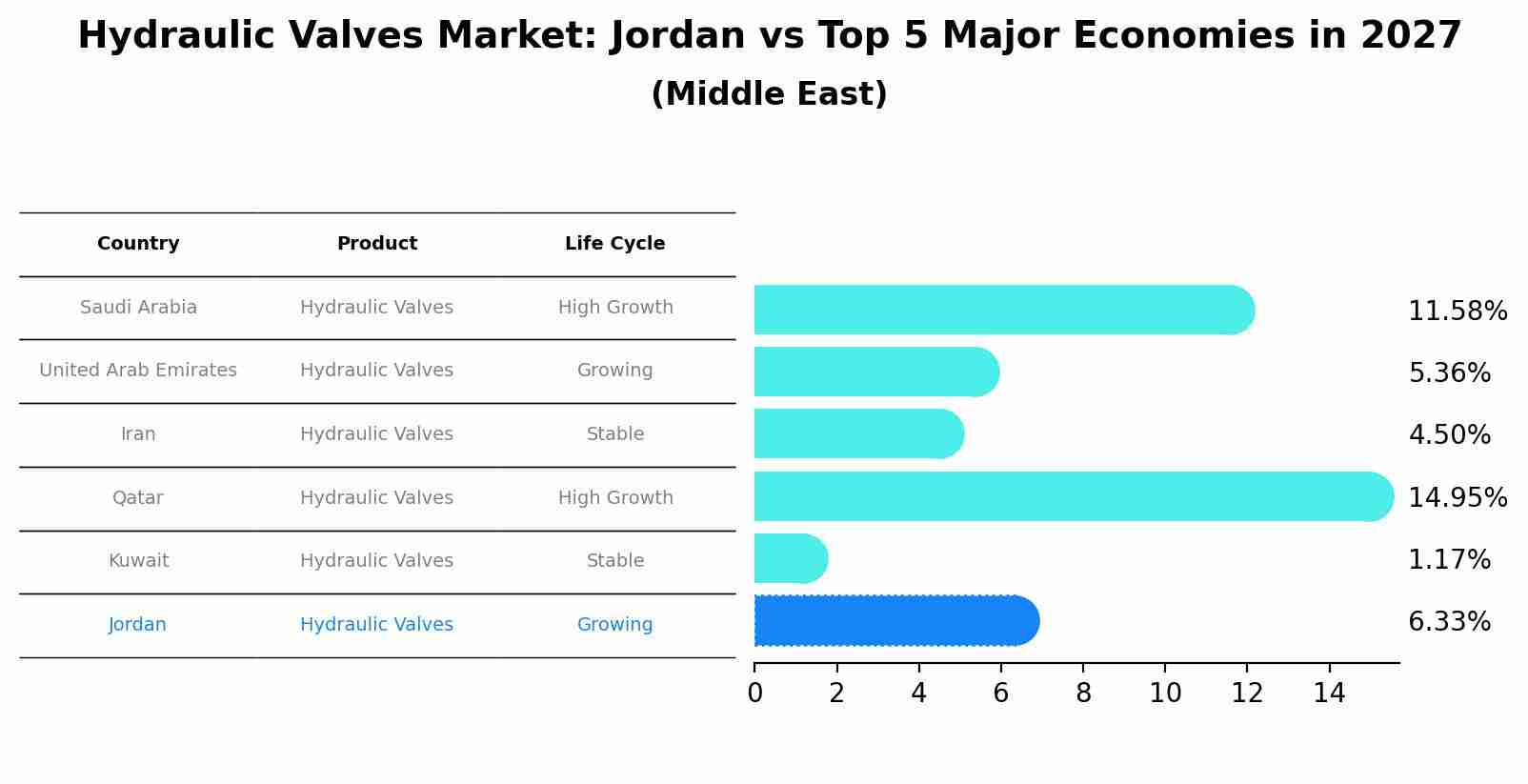Jordan Hydraulic Valves Market Outlook | Companies, Value, Trends, COVID-19 IMPACT, Industry, Revenue, Size, Analysis, Forecast, Growth & Share
| Product Code: ETC365086 | Publication Date: Aug 2022 | Updated Date: Aug 2025 | Product Type: Market Research Report | |
| Publisher: 6Wresearch | Author: Summon Dutta | No. of Pages: 75 | No. of Figures: 35 | No. of Tables: 20 |
Jordan Hydraulic Valves Market Size Growth Rate
The Jordan Hydraulic Valves Market is projected to witness mixed growth rate patterns during 2025 to 2029. From 6.54% in 2025, the growth rate steadily ascends to 6.89% in 2029.

Hydraulic Valves Market: Jordan vs Top 5 Major Economies in 2027 (Middle East)
The Hydraulic Valves market in Jordan is projected to grow at a growing growth rate of 6.33% by 2027, highlighting the country's increasing focus on advanced technologies within the Middle East region, where Saudi Arabia holds the dominant position, followed closely by United Arab Emirates, Iran, Qatar and Kuwait, shaping overall regional demand.

Jordan Hydraulic Valves Market Synopsis
The Jordan Hydraulic Valves Market is experiencing steady growth driven by the expanding industrial sector in the country. The demand for hydraulic valves is primarily fueled by the increasing automation in industries such as manufacturing, construction, and agriculture. Key players in the market are focusing on product innovation, such as the development of advanced hydraulic valves with improved efficiency and durability. Additionally, the rising investments in infrastructure projects in Jordan are boosting the demand for hydraulic valves for use in heavy machinery and equipment. The market is competitive, with both local and international manufacturers vying for market share. Overall, the Jordan Hydraulic Valves Market is poised for further growth as industries continue to modernize and adopt advanced technologies.
Jordan Hydraulic Valves Market Trends
The Jordan Hydraulic Valves Market is experiencing a growing demand for more efficient and technologically advanced products. Key trends include the adoption of smart valves with sensors and monitoring capabilities to enhance performance and enable predictive maintenance. There is also a shift towards environmentally friendly hydraulic valves that are designed to reduce energy consumption and minimize environmental impact. Additionally, the market is witnessing an increased focus on customization and modular designs to meet specific application requirements across industries such as manufacturing, construction, and agriculture. Overall, the Jordan Hydraulic Valves Market is moving towards innovation, sustainability, and customization to address the evolving needs of customers and industries in the region.
Jordan Hydraulic Valves Market Challenges
The Jordan Hydraulic Valves Market faces challenges such as intense competition from international players offering advanced technologies and lower prices, resulting in pricing pressures for local manufacturers. Additionally, the lack of skilled labor and limited access to raw materials locally further hinder the growth of the market. The political and economic instability in the region can also impact the market dynamics, leading to fluctuations in demand and investment uncertainty. Moreover, the need for continuous innovation and adaptation to meet changing customer requirements poses a challenge for companies operating in the Jordan Hydraulic Valves Market. Overall, addressing these challenges requires strategic planning, investment in technology and skills development, and a focus on improving operational efficiency to remain competitive in the market.
Jordan Hydraulic Valves Market Investment Opportunities
Investment opportunities in the Jordan Hydraulic Valves Market are promising due to the region`s growing industrial sector and increasing infrastructure development projects. With a focus on enhancing efficiency and productivity, there is a rising demand for high-quality hydraulic valves in various industries such as manufacturing, construction, and agriculture. Investors can capitalize on this trend by investing in companies that manufacture, distribute, or provide services related to hydraulic valves in Jordan. Additionally, opportunities exist in technological advancements such as smart valves and IoT integration, which can further drive growth in the market. Overall, investing in the Jordan Hydraulic Valves Market presents a favorable outlook for those looking to benefit from the country`s economic growth and industrial expansion.
Jordan Agar Market Government Policies
The Jordanian government has implemented several policies to regulate the Hydraulic Valves Market. These policies include import regulations to ensure quality standards are met, tariffs on imported hydraulic valves to protect domestic manufacturers, and tax incentives to encourage local production and investment in the sector. Additionally, the government has promoted research and development initiatives to enhance technology and innovation within the industry. Environmental regulations are also in place to ensure that hydraulic valve manufacturers adhere to sustainable practices. Overall, the government`s policies aim to support the growth of the Jordan Hydraulic Valves Market by balancing the interests of domestic manufacturers, ensuring quality standards, promoting innovation, and safeguarding the environment.
Jordan Hydraulic Valves Market Future Outlook
The future outlook for the Jordan Hydraulic Valves Market looks promising as the country continues to invest in infrastructure development projects across various sectors such as construction, manufacturing, and agriculture. With the growing demand for efficient hydraulic systems to enhance productivity and performance, the market is expected to experience steady growth in the coming years. Additionally, advancements in technology and increased automation in industrial processes are likely to drive the adoption of hydraulic valves further. Key players in the market are focusing on product innovation and expanding their distribution networks to capitalize on the rising demand. Overall, the Jordan Hydraulic Valves Market is poised for expansion and presents opportunities for manufacturers and suppliers to meet the evolving needs of diverse industries in the region.
Key Highlights of the Report:
- Jordan Hydraulic Valves Market Outlook
- Market Size of Jordan Hydraulic Valves Market, 2021
- Forecast of Jordan Hydraulic Valves Market, 2031
- Historical Data and Forecast of Jordan Hydraulic Valves Revenues & Volume for the Period 2018 - 2031
- Jordan Hydraulic Valves Market Trend Evolution
- Jordan Hydraulic Valves Market Drivers and Challenges
- Jordan Hydraulic Valves Price Trends
- Jordan Hydraulic Valves Porter's Five Forces
- Jordan Hydraulic Valves Industry Life Cycle
- Historical Data and Forecast of Jordan Hydraulic Valves Market Revenues & Volume By Type for the Period 2018 - 2031
- Historical Data and Forecast of Jordan Hydraulic Valves Market Revenues & Volume By Directional Control Valves for the Period 2018 - 2031
- Historical Data and Forecast of Jordan Hydraulic Valves Market Revenues & Volume By Pressure Control Valves for the Period 2018 - 2031
- Historical Data and Forecast of Jordan Hydraulic Valves Market Revenues & Volume By Flow Control Valves for the Period 2018 - 2031
- Historical Data and Forecast of Jordan Hydraulic Valves Market Revenues & Volume By End-Use for the Period 2018 - 2031
- Historical Data and Forecast of Jordan Hydraulic Valves Market Revenues & Volume By Construction Machinery for the Period 2018 - 2031
- Historical Data and Forecast of Jordan Hydraulic Valves Market Revenues & Volume By Agriculture Machinery for the Period 2018 - 2031
- Historical Data and Forecast of Jordan Hydraulic Valves Market Revenues & Volume By Material Handling for the Period 2018 - 2031
- Historical Data and Forecast of Jordan Hydraulic Valves Market Revenues & Volume By Automotive for the Period 2018 - 2031
- Historical Data and Forecast of Jordan Hydraulic Valves Market Revenues & Volume By Oil & Gas for the Period 2018 - 2031
- Historical Data and Forecast of Jordan Hydraulic Valves Market Revenues & Volume By Power Generation for the Period 2018 - 2031
- Historical Data and Forecast of Jordan Hydraulic Valves Market Revenues & Volume By Metal & Mining for the Period 2018 - 2031
- Historical Data and Forecast of Jordan Hydraulic Valves Market Revenues & Volume By Others for the Period 2018 - 2031
- Historical Data and Forecast of Jordan Hydraulic Valves Market Revenues & Volume By Flow Rate for the Period 2018 - 2031
- Historical Data and Forecast of Jordan Hydraulic Valves Market Revenues & Volume By Below 50 L/min for the Period 2018 - 2031
- Historical Data and Forecast of Jordan Hydraulic Valves Market Revenues & Volume By 50-200 L/min for the Period 2018 - 2031
- Historical Data and Forecast of Jordan Hydraulic Valves Market Revenues & Volume By 201-500 L/min for the Period 2018 - 2031
- Historical Data and Forecast of Jordan Hydraulic Valves Market Revenues & Volume By 501-1000 L/min for the Period 2018 - 2031
- Historical Data and Forecast of Jordan Hydraulic Valves Market Revenues & Volume By Above 1000 L/min for the Period 2018 - 2031
- Historical Data and Forecast of Jordan Hydraulic Valves Market Revenues & Volume By Operation for the Period 2018 - 2031
- Historical Data and Forecast of Jordan Hydraulic Valves Market Revenues & Volume By Manual for the Period 2018 - 2031
- Historical Data and Forecast of Jordan Hydraulic Valves Market Revenues & Volume By Automated for the Period 2018 - 2031
- Jordan Hydraulic Valves Import Export Trade Statistics
- Market Opportunity Assessment By Type
- Market Opportunity Assessment By End-Use
- Market Opportunity Assessment By Flow Rate
- Market Opportunity Assessment By Operation
- Jordan Hydraulic Valves Top Companies Market Share
- Jordan Hydraulic Valves Competitive Benchmarking By Technical and Operational Parameters
- Jordan Hydraulic Valves Company Profiles
- Jordan Hydraulic Valves Key Strategic Recommendations
Frequently Asked Questions About the Market Study (FAQs):
- Single User License$ 1,995
- Department License$ 2,400
- Site License$ 3,120
- Global License$ 3,795
Search
Thought Leadership and Analyst Meet
Our Clients
Related Reports
- Afghanistan Apparel Market (2026-2032) | Growth, Outlook, Industry, Segmentation, Forecast, Size, Companies, Trends, Value, Share, Analysis & Revenue
- Canada Oil and Gas Market (2026-2032) | Share, Segmentation, Value, Industry, Trends, Forecast, Analysis, Size & Revenue, Growth, Competitive Landscape, Outlook, Companies
- Germany Breakfast Food Market (2026-2032) | Industry, Share, Growth, Size, Companies, Value, Analysis, Revenue, Trends, Forecast & Outlook
- Australia Briquette Market (2025-2031) | Growth, Size, Revenue, Forecast, Analysis, Trends, Value, Share, Industry & Companies
- Vietnam System Integrator Market (2025-2031) | Size, Companies, Analysis, Industry, Value, Forecast, Growth, Trends, Revenue & Share
- ASEAN and Thailand Brain Health Supplements Market (2025-2031) | Strategy, Consumer Insights, Analysis, Investment Trends, Opportunities, Growth, Size, Share, Industry, Revenue, Segments, Value, Segmentation, Supply, Forecast, Restraints, Outlook, Competition, Drivers, Trends, Demand, Pricing Analysis, Competitive, Strategic Insights, Companies, Challenges
- ASEAN Bearings Market (2025-2031) | Strategy, Consumer Insights, Analysis, Investment Trends, Opportunities, Growth, Size, Share, Industry, Revenue, Segments, Value, Segmentation, Supply, Forecast, Restraints, Outlook, Competition, Drivers, Trends, Demand, Pricing Analysis, Competitive, Strategic Insights, Companies, Challenges
- Europe Flooring Market (2025-2031) | Outlook, Share, Industry, Trends, Forecast, Companies, Revenue, Size, Analysis, Growth & Value
- Saudi Arabia Manlift Market (2025-2031) | Outlook, Size, Growth, Trends, Companies, Industry, Revenue, Value, Share, Forecast & Analysis
- Uganda Excavator, Crane, and Wheel Loaders Market (2025-2031) | Strategy, Consumer Insights, Analysis, Investment Trends, Opportunities, Growth, Size, Share, Industry, Revenue, Segments, Value, Segmentation, Supply, Forecast, Restraints, Outlook, Competition, Drivers, Trends, Demand, Pricing Analysis, Competitive, Strategic Insights, Companies, Challenges
Industry Events and Analyst Meet
Whitepaper
- Middle East & Africa Commercial Security Market Click here to view more.
- Middle East & Africa Fire Safety Systems & Equipment Market Click here to view more.
- GCC Drone Market Click here to view more.
- Middle East Lighting Fixture Market Click here to view more.
- GCC Physical & Perimeter Security Market Click here to view more.
6WResearch In News
- Doha a strategic location for EV manufacturing hub: IPA Qatar
- Demand for luxury TVs surging in the GCC, says Samsung
- Empowering Growth: The Thriving Journey of Bangladesh’s Cable Industry
- Demand for luxury TVs surging in the GCC, says Samsung
- Video call with a traditional healer? Once unthinkable, it’s now common in South Africa
- Intelligent Buildings To Smooth GCC’s Path To Net Zero


















